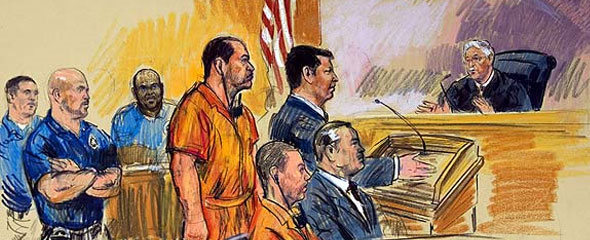
A new study by Berkeley University finds that Colombian paramilitary bosses extradited to the U.S. are not encouraged to testify about human rights abuses they have committed, hindering Colombia’s Justice and Peace process. The study urges the U.S. to establish better procedures and “break the cycle of impunity.”
Berkeley’s International Human Rights Law Clinic (IHRLC) recommends in its “Truth behind bars” report, released today, that “efficient and effective” procedures be established to encourage the paramilitary leaders to reveal details of their crimes and accomplices. The study will be presented to members of U.S. Congress and officials from the State Justice Department next week.
According to the report, Colombia’s Justice and Peace process began because Colombia and the U.S. lacked a written agreement outlining bilateral judicial cooperation, so paramilitaries were extradited to the U.S. solely on drug trafficking charges. As a result, only five of the fifteen paramilitary chiefs extradited in May 2008 have continued to publicly give their versions of the truth.
The Berkeley investigators criticize the fact that 21 months after extradition none of the paramilitary bosses have been sentenced, and ask the U.S. government to support Colombian investigations into their crimes.
“The current investigations… offer the U.S. a unique opportunity to break the cycle of impunity… The ex paramilitary commanders are capable of providing information critical to cases of human rights violations… The U.S. is losing an exceptional opportunity to dismantle the drug cartels that the paramilitaries have dominated for decades,” the report finds.
One obstacle has been that North American prosecutors have not prioritized the attempts of victims of paramilitary organizations to oblige the former “para” bosses to reveal information of their crimes, the report finds. Colombian authorities have sent various requests to the U.S. Embassy seeking judicial cooperation but U.S. officials have failed to adequately respond, resulting in the para chiefs accounts going unheard, according to the report.
Another logistic impediment has been the Justice and Peace Law’s stipulation that victims must directly confront their aggressors. Extradition has hindered this testimony from being heard, IHRLC claims.
The report recommends that the Obama administration encourage extradited paramilitaries to give testimony, and advise former chiefs that if they remain mute, they may be investigated for torture.
“Those who form public policy in the U.S. have a moral and legal responsibility to help Colombian authorities resolve these horrendous crimes. If the U.S. actively supports confessions, this will help to strengthen the state, to resolve murders in Colombia and to dismantle the violent drug cartels,” Roxanna Altholz, associate director of the IHRLC told El Espectador.
To read the full report, click here.

